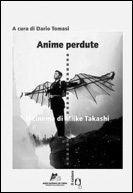Anime Perdute: Il cinema di Miike Takashi
by Tom Mes
In April 2006 the Museo Nazionale del Cinema in Turin, Italy played host to the world's first large-scale retrospective of the films of Takashi Miike. In the past few years, there has been no shortage of festival homages to the man whose work has arguably become one of Japan's main cultural exports, but a genuine, representative overview had not yet been attempted. No surprise perhaps, given the vast number of films churned out by the workaholic director in his fifteen-year career. Procuring images from the various production companies he has worked for over the past decade and a half proved to be the biggest challenge when I was writing my own book Agitator: some have gone out of business, others have been rather careless with their assets and yet others simply don't bother cooperating or demand unreasonable sums of money. I can only imagine how hard it must be to get hold of the actual film prints.
If such an undertaking would already prove difficult for anyone based in Japan, when you're stationed in Europe the odds are even more solidly stacked against you. This makes the collaborative efforts of the Turin film museum and the Japanese film society/fan club Neo(N)eiga to get this retrospective off the ground all the more worthy of respect and praise. We can but stand in admiration at the fruits of their labour: a program of a good two dozen films, spanning from 1995 to the present (no prints exist of Miike's pre-95 straight-to-video productions), and this rather wonderful volume of essays penned by some of the leading authorities on the subject.
There is much to be said and, in spite of my own best efforts, a lot still left to be said about the cinema of Takashi Miike. He has already proven to be much more than a flavour of the month, gaining increasing critical favour while relinquishing none of his uniqueness or ability to get under people's skins (see the recent Masters of Horror uproar). For those who hadn't yet noticed, yes, there is more going on here than meets the eye, and the contributors to Anime Perdute ('Lost souls') certainly rise to the occasion to provide a meticulous chronicle of the phenomenon: a look at his assistant director days by way of a meticulous, critical read-through of Miike's autobiography (Kantoku Chudoku, 'Director junkie', published in Japan by PIA), courtesy of Mark Schilling; yours truly chiming in with an exposé on the world of V-cinema and how it shaped Miike's philosophies of filmmaking; Aaron Gerow pointing out finely and convincingly that there is no such thing as a division between a violent surface and an underlying meaning in Miike's film; personal recollections by long-time Miike supporter and collaborator Tokitoshi Shiota; Pier Maria Bocchi on the joys of genderbending and sexual deviancy; Maria Roberta Novielli tackling the key theme of borders and roots. This is only a sampling of the diverse riches on offer here - diverse, because the collected writings in Anime Perdute go beyond merely offering the expected thematical analyses to also highlight the practical, the cultural, and the historical.
With other contributors including leading Japanese culture critic Inuhiko Yomota, former Venice film festival director and current Turin film museum head Alberto Barbera, Neo(N)eiga main man Fabio Rainelli, and the book's editor Dario Tomasi, this book was clearly put together with the same intrepid fervour that fuelled the retrospective itself. Anime Perdute is entirely in Italian, but then, you're never too old to learn. This would certainly be a good reason to give it a go.
